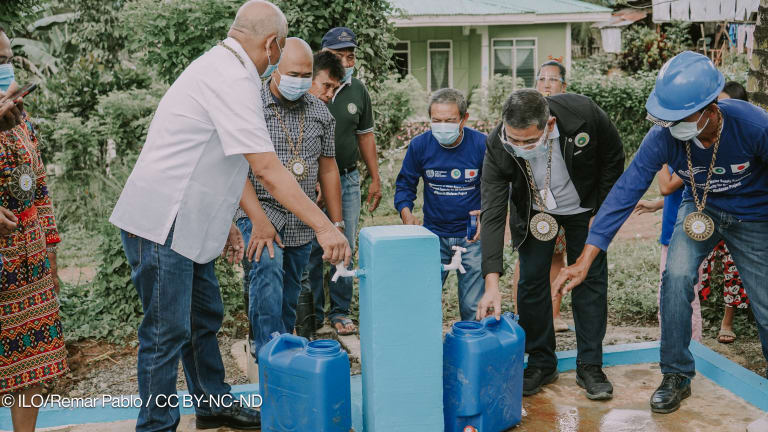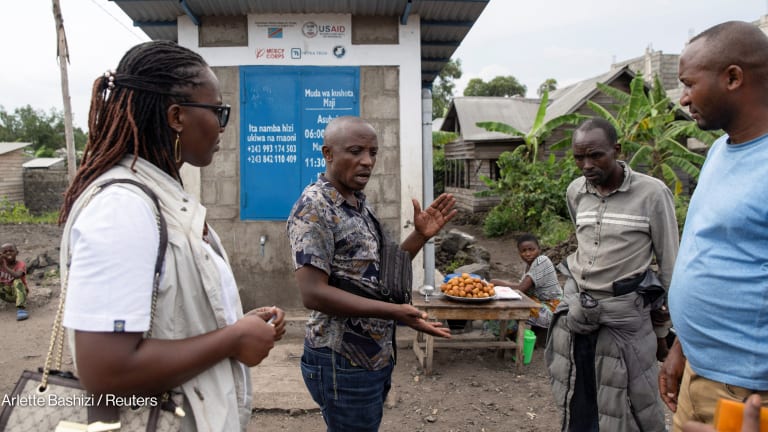
Diversity defines Asia. Many countries continue to receive aid; some have become donors themselves while grappling with significant poverty at home.
Asia’s experience provides an important lesson, says Christopher Spohr: Development should be based on in-depth understanding of local context.
A senior education economist at the Asian Development Bank, Spohr is one the most influential development leaders aged 40 and under in Manila.
Devex is recognizing 40 of these young trailblazers in international development. They are social entrepreneurs, government leaders, development consultants, business innovators, advocates, development researchers, nonprofit executives and journalists.
We spoke to Spohr about development knowledge sharing and lessons from the conditional cash transfer program in the Philippines.
The Philippines’ conditional cash transfer program is garnering praise in many quarters of the local and international development community. From your vantage point as team leader of ADB’s support for the program, what have been some of the factors behind its success?
If I could borrow Devex’s slogan, I think most critical has been a strong commitment by the Department of Social Welfare and Development and the government to ”Do good. Do it well.”
Firstly, the Philippines CCT program is exactly that: the Philippines’ own program, backed up by strong ownership for this Pantawid Pamilya program and a broader poverty reduction agenda. While I may stray from conventional economics, I think the Philippines’ case demonstrates that growth by itself is not enough — from 2003 to 2009, growth of roughly 5 percent annually coincided with worsening poverty. Recognizing that, the government has stepped up targeted interventions to tackle poverty and vulnerability, to ensure that all elements of society can benefit from growth that is inclusive. ADB and other development partners have been have been keen supporters of Pantawid Pamilya and other government-led efforts.
Secondly, in order to “do it well,” DSWD and the government first looked to international evidence. Globally, CCTs have been almost without question the most rigorously evaluated development intervention. Such evaluations point to strong successes that are founded in concerted investments in building institutions and mechanisms, including those to objectively target beneficiaries, verify household compliance conditions, ensure transparent and complete flow of funds directly to beneficiaries, and so on. In constructing what is now Asia’s leading CCT program, the Philippines drew on such evidence of what works, while tailoring the Pantawid Pamilya model to the local context.
Finally, Pantawid Pamilya has arguably set a new standard in the Philippines in terms of monitoring and evaluation aimed at providing hard, real-time evidence of what is working and what needs further strengthening. This includes independent spot checks and Pantawid Pamilya’s grievance redress system, allowing beneficiary communities to voice any concerns. I would also applaud DSWD and the government for committing to conduct a three-round series of rigorous impact evaluations of Pantawid Pamilya, in cooperation with ADB, the World Bank and AusAID, and involving various stakeholders in an open dialogue on program impact.
Are there other initiatives that you believe could also make a significant development impact?
One key priority is fleshing out and fully operationalizing a framework, strategy and mechanisms for “transition promotion,” namely a road map for coordinated interventions by DSWD and other central and local agencies as well as nongovernment partners to empower poor CCT beneficiary families and promote their transition out of poverty on a sustainable basis.
Poverty and vulnerability are complex and multiheaded beasts, and thus need to be met with sustained and multidimensional interventions. This is very much recognized by the government and is reflected in convergence efforts aimed at aligning efforts by DSWD other agencies, and also broader partners — ranging from civil society organizations to corporate social responsibility actors — so that all hands pull together.
To cite one dimension of convergence and transition promotion, DSWD’s efforts to tap civil society are noteworthy and rather unique among CCT programs internationally. We’ve been supporting DSWD efforts to establish new institutional mechanisms for engaging CSOs as partners within Pantawid Pamilya. The latter includes mobilizing CSOs to facilitate family development sessions and linked FDS-Plus interventions to promote Pantawid Pamilya households’ transition out of poverty through initiatives in areas such as literacy and numeracy, livelihoods skills and community mobilization. A second pilot on mobilizing CSOs for independent follow-up on GRS grievances is also planned.
However, involving CSOs at the grass-roots level is but one example. At the more macro end of the spectrum, it will be critical to involve various agencies and the private sector to engineer a broader shift in the Philippines from a so-called “jobless growth” model to one that opens up opportunities for decent employment, particularly at the bottom of the pyramid.
How much do Asian countries have to learn from their neighbors when it comes to addressing development challenges?
One of my favorite Chinese idioms is “走马观花” or literally “observing flowers from horseback,” referring to the dangers of making judgments based on superficial understanding.
Asia is tremendously diverse. On one hand, it has been called the “development miracle” of the last half century; on the other hand, it’s a kaleidoscope of both successes and challenges. We see this in the coexistence of rapid growth and pervasive poverty and inequality. We also observe this in terms of markedly distinct development paths across countries and across areas within any single country.
So, yes, development experiences within Asia can be immensely useful to neighbors within the region (and globally), however this must be grounded in an in-depth understanding of development contexts, rather than blindly applying “cookie cutter” or carbon-copy approaches. Geography, political institutions, and even history and culture matter.
As a development economist and a self-termed “socio-economist,” this diversity within Asia’s development miracle is exactly what drew me to Asia.
For nearly 15 years, I have been very privileged to have had the opportunity to work in countries like the Philippines, the People’s Republic of China, and most recently Myanmar, as that country embarks on rapid political and socioeconomic transformation. ADB actively supports regional cooperation and knowledge sharing, and I see part of my own role as helping our developing member countries to learn about relevant models and experiences elsewhere in the region. However, I do so with a conscious humility that I too am still always on the learning curve in this ever evolving region.
Read more about the Devex 40 Under 40 International Development Leaders in Manila.








